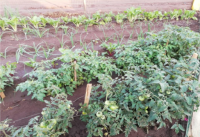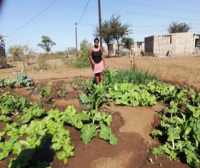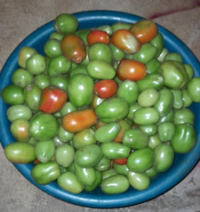The concept of social development in Africa is familiar to us; we have all lived and observed other acts of social responsibility in our communities. As Africans, we are taught about Ubuntu, meaning “the quality of being human”. We are taught to share our little with our neighbours and always keep our doors open to show everyone is welcome. An African proverb explains Ubuntu; it says ‘’ umntu ngumntu ngabantu’ (A person through other people). This reveals a world view that we owe our selfhood to others, that we are first and foremost social beings. This can be seen and felt in the spirit of willing participation, unquestioning cooperation, warmth and openness to better our communities.
In education, teachers are servants of the people. Part of being a good teacher is being willing to contribute your time and energy, both in and outside of the classroom, for the betterment of your students and citizens of the communities that your students come from.
 Future Leader Masesi Nkwamba shared her journey on extending the GTI Social Responsibility domain into her community and how she has become a social activist that inspires change by starting a community food garden, The Young Farmers. The Yong Farmers food garden is a youth-driven project growing various vegetables for the Ehlanzeni – Nkomanzi community in Mpumalanga to help them fight against poverty. With unemployment at its highest rate of 34.4% in South Africa, these youth are taking matters into their own hands to support their families and elevate some pressure off them.
Future Leader Masesi Nkwamba shared her journey on extending the GTI Social Responsibility domain into her community and how she has become a social activist that inspires change by starting a community food garden, The Young Farmers. The Yong Farmers food garden is a youth-driven project growing various vegetables for the Ehlanzeni – Nkomanzi community in Mpumalanga to help them fight against poverty. With unemployment at its highest rate of 34.4% in South Africa, these youth are taking matters into their own hands to support their families and elevate some pressure off them.
They buy seeds at the local nursery and plant them in empty egg trays to start the germination process, and carefully take care of the seeds as they grow to produce food. Masesi shared that what motivated her to work closely with the youth aside from unemployment was to instil new beliefs and change the perceptions of how farming is viewed as an activity for uneducated and older people. “I want to be an agent of change in my community. I want to change mindsets and influence positive behaviour,” she said
Since the project started, the youth have successfully harvested tomatoes, spinach, cabbage, and other vegetables, encouraging them to start a new crop for summer. The Ehlanzeni – Nkomazi community has significantly benefited from this project as a source of fresh vegetables without travelling to the nearest town. Masesi and her team have experienced some difficulty getting water for the garden because they have to fetch water from a nearby tap that is 6kms away and borrow wheelbarrows and water drums from community members to make sure they have enough supply for a week. When the weather is unkind to them, they have to buy 10L bottles from nearby shops.
Plans for the summer crop have started, and the youth have sourced resources like old tyers and basins to help create more space for planting as there is a high demand for fresh vegetables from the community. They have signed a contract with a local business that will be providing them with a full 5000L tank of water every month for R100. They are struggling with a sponsor for fertiliser and have been creative by using cow dung and collecting compost from their homes.



Masesi reflected on how most teenagers were shy initially, but now they are free and interested in growing different vegetables. Through this project, she has learned that the skills she developed in Mathematics while in school are assisting her a lot. She has calculated ahead of planting the amount of fertiliser and water needed for the garden through measuring and other data collection methods. The Ehlanzeni- Nkomanzi community is surviving from this small garden. Massi and her team are truly grateful for all the small donations they have received to sustain and grow this project and encourage other surrounding rural communities to start doing similar projects.
Social development is an extension of Ubuntu by consciously developing communities and putting people at the centre of that development. It is about improving the well-being of every individual in society so they can reach their full potential. The success of a society is linked to the well-being of every citizen. Social development means investing in people. It requires removing barriers so that all citizens can journey toward their dreams with confidence and dignity. It is about refusing to accept that people who live in poverty will always be poor. It is about helping people so they can move forward on their respective paths to self-sufficiency.
Teachers do not exit or teach in environments that are dissociated from society. They contribute largely to creating and recreating aspects of social life and inherit the realities that learners and teachers carry into school each day. Therefore global teachers must be involved in these social spaces. Understanding how learners are situated in the world and within the local and international context helps teachers make more informed decisions about how they want to structure their classrooms and lessons. Understanding that teachers are responsible for society shifts one’s perspective on the learning and schooling process. It highlights how impactful a teacher’s small actions can be.
